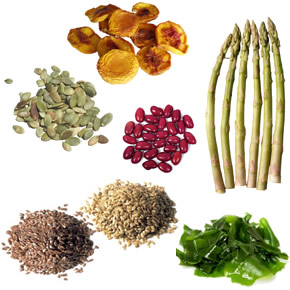Iron is an integral part of many proteins and enzymes which maintain our good health and an essential component of protein involved in oxygen transport, regulation of cell growth and differentiation. Two thirds of our iron can be found in haemoglobin - the protein in red blood cells which carries oxygen to our tissues. Other amounts of iron can be found in myoglobin, a protein which helps supply oxygen to muscles and in enzymes to help reactions in our body. It is also stored for future needs and regulation by absorption in out intestines. Therefore the main functions of iron are to:
- Transport and store oxygen
- Aid in energy production and cell diffusion
- Help the immune system and central nervous system
Some of the most common symptoms of iron deficiency are:
- Fatigue
- Weakness
- Rapid heartbeat
- Fainting
- Susceptibility to infection, and
- Swelling of the tongue
Common causes of iron deficiency in adults include:
- Inadequate dietary intake – the two types of iron include haem iron (found in animal foods) and non-haem iron (from plant products). The body absorbs haem iron much more easily than non-haem iron. There are many reasons why the dietary intake of iron could be inadequate, including a poorly balanced vegetarian diet, chronic fad dieting or limited access to a wide range of fresh foods – for example, as a result of living in remote areas or having a low income.
- Blood loss – iron deficiency easily occurs in situations of chronic blood loss. Common causes include heavy menstrual periods, regular blood donation, chronic disorders that involve bleeding (such as peptic ulcers, polyps or cancers in the large intestine) and certain medications, particularly aspirin.
- Increased need – the adolescent growth spurt, pregnancy and breastfeeding are situations when the body requires more iron. If this increased need isn’t met, a deficiency can quickly occur.
- Exercise – athletes are prone to iron deficiency because regular exercise increases the body’s need for iron in a number of ways. For example, hard training promotes red blood cell production, while iron is lost through sweating.
- Inability to absorb iron – healthy adults absorb about ten to 15 per cent of dietary iron, but some people’s bodies are unable to absorb or use iron from food.
A gradual decline in iron
Every red blood cell contains haemoglobin, a complex protein that carries oxygen. Haemoglobin is partly made from iron and accounts for about two thirds of the body’s iron supply. The body stores iron for use during times when dietary intake is inadequate.
If your need for dietary iron isn’t met, your body’s iron stores will decline over time due to:
Iron depletion – haemoglobin levels are normal, but the body only has a small amount of stored iron, which will soon run out. This stage usually has no obvious symptoms.
Iron deficiency – stored and blood-borne iron stores are low and haemoglobin levels have dropped below normal. You may experience some symptoms, including tiredness.
Iron deficiency anaemia – haemoglobin levels are so low that the blood is unable to deliver enough oxygen to the cells. Symptoms include looking very pale, breathlessness, dizziness and fatigue. Reduced immune function and impaired growth and cognition can also be symptoms.

So how can we make sure we get enough iron? Firstly its important not to self diagnose iron deficiency and take supplements as there are many causes of fatigue and decreased immunity which should be investigated for and too much iron can also cause fatigue. Too much iron can also impair absorption of other minerals such as zinc and copper. Your body can only absorb iron and cannot excrete it. Furthermore iron supplements often lead to unwanted symptoms such as constipation and abdominal discomfort. Make sure you are eating a variety of the right foods with a higher iron content....
- High-risk groups such as vegetarians, adolescent girls and women athletes need to eat iron-rich foods each day (combined with foods that are high in vitamin C).
- Wholegrain cereals, meat, poultry and fish are good sources of dietary iron.
- Liver is an especially rich source of iron, but pregnant women should avoid this source because of its high content of vitamin A.
- Choose iron-fortified breakfast cereals and breads.
- Vegetarians who exclude all animal products from their diet may need almost twice as much dietary iron each day as non-vegetarians. Sources include dark green leafy vegetables, such as spinach, broccoli, prunes, dried apricots, raisins, nuts, seeds, dried beans and peas, and iron-fortified cereals, breads and pastas.
- Vitamin C increases iron absorption, so eat more brightly coloured fruits and vegetables.
- Cut back on the amount of tea and coffee you drink, especially around mealtimes, since the tannins in tea and coffee bind to the iron and interfere with absorption.

Rockin Raw
xox
No comments:
Post a Comment